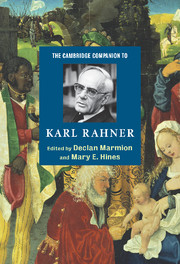1 - Theology and spirituality
from Part I - Spiritual, Philosophical, and Theological Roots
Published online by Cambridge University Press: 28 May 2006
Summary
Karl Rahner has been rightly praised as the twentieth century “Father” of Roman Catholic theology and as “the quiet mover of the Catholic Church.” His four thousand written works show his profundity as a philosopher and as a multi-faceted theological genius. They also indicate his talent as a preacher, a retreat director, and a teacher of prayer. A great ecumenist, he entered into dialogue with atheist, Buddhist, Jewish, Marxist, Muslim, Protestant, and scientific thinkers the world over.
Although this Catholic titan defies easy classification, many of Rahner's earliest commentators wrote almost exclusively about his philosophical theological- speculative prowess. More recent studies have corrected this imbalance by accenting the spiritual dimension of even his most difficult writings, particularly as this relates to his own Jesuit and priestly life. However, this chapter will attempt to make evident the indissoluble marriage of theology and spirituality which runs throughout almost all the Rahnerian enterprise.
A SAPIENTIAL THEOLOGIAN
When praised by an interviewer for his numerous publications, Rahner replied: “I always stressed that in point of fact by profession I never claimed to be a scientific researcher either in philosophy or in theology. I never practised theology as a sort of art for art’s sake. I think I can say that my publications usually grew out of pastoral concern. But in comparison to professional scholars I have remained a theological dilettante.” Thus, he spoke of himself only as a man, a Christian, and a priest – not as an academic scholar. When asked a few years before his death about his theology, he reiterated that his theological norm centered on pastoral problems relating to the proclamation of the gospel in ways the contemporary person can understand.
- Type
- Chapter
- Information
- The Cambridge Companion to Karl Rahner , pp. 13 - 28Publisher: Cambridge University PressPrint publication year: 2005



